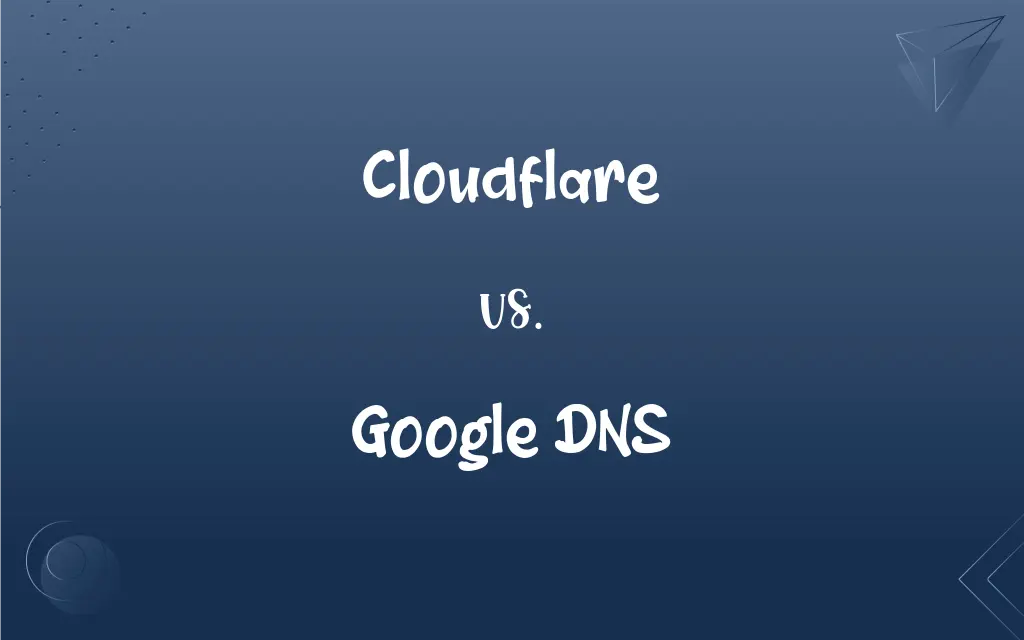Cloudflare vs. Google DNS: What's the Difference?
Edited by Aimie Carlson || By Janet White || Published on May 21, 2024
Cloudflare provides web security and content delivery network services, whereas Google DNS is a domain name system service offering improved internet connection speed and reliability.

Key Differences
Cloudflare and Google DNS are distinct in their primary functions and services. Cloudflare is widely recognized for its web security services and content delivery network (CDN), which enhance website performance and protection. Google DNS, conversely, is a domain name system service focused on converting domain names into IP addresses, thus facilitating faster and more reliable internet connections.
Cloudflare offers a range of services including DDoS protection, secure sockets layer (SSL) encryption, and distributed domain name server services. It helps in mitigating cyber threats and speeding up website loading times. Google DNS, on the other hand, primarily provides DNS resolution services, emphasizing the speed and security of internet browsing without directly offering website protection or performance acceleration.
In terms of security, Cloudflare provides comprehensive solutions to protect websites against multiple cyber threats. Its services are essential for website owners seeking to safeguard their online presence. Google DNS contributes to security indirectly by offering a secure and reliable way to connect to websites, but it doesn’t provide direct protection to the websites themselves.
Regarding network infrastructure, Cloudflare operates a vast global network of servers to optimize content delivery and reduce latency for websites. This network infrastructure plays a crucial role in its CDN and web security services. Google DNS, while also having a global presence, focuses on DNS resolution, ensuring that users can access websites quickly and reliably by translating domain names to IP addresses efficiently.
Both Cloudflare and Google DNS play vital roles in the internet ecosystem, they serve different purposes. Cloudflare is a go-to for web security and CDN services, enhancing website performance and protection, whereas Google DNS is specialized in DNS resolution, providing a faster and more secure internet browsing experience.
ADVERTISEMENT
Comparison Chart
Primary Function
Web security and CDN services
DNS resolution service
Key Services
DDoS protection, SSL, domain name server
DNS resolution, internet speed and security
Security Focus
Direct protection for websites
Secure and reliable DNS service
Infrastructure
Global server network for content delivery
Global infrastructure for DNS resolution
Target Audience
Website owners, businesses
General internet users
ADVERTISEMENT
Cloudflare and Google DNS Definitions
Cloudflare
Enhances website security with SSL encryption.
Implementing SSL from Cloudflare improved our website's security.
Google DNS
Converts domain names into IP addresses.
Google DNS facilitates quick website access by efficient domain name resolution.
Cloudflare
Specializes in mitigating cyber threats.
Our company relies on Cloudflare for its advanced threat mitigation capabilities.
Google DNS
Known for its focus on security in DNS resolution.
Google DNS offers added security features to protect against DNS-based threats.
Cloudflare
Offers services to optimize website performance.
We use Cloudflare to reduce our website's loading time.
Google DNS
Aims to enhance internet browsing speed and reliability.
Since we started using Google DNS, our browsing experience has become more reliable.
Cloudflare
Provides distributed DNS services.
Cloudflare's DNS services helped in managing our web traffic more efficiently.
Google DNS
A domain name system service by Google.
Switching to Google DNS improved our internet connection speed.
Cloudflare
A web security and CDN service provider.
Cloudflare's DDoS protection safeguarded our website during a cyber attack.
Google DNS
Offers a free, global DNS resolution service.
Google DNS is a popular choice for its free and fast domain name resolution service.
FAQs
Can Cloudflare protect against DDoS attacks?
Yes, Cloudflare offers DDoS protection services.
Is Google DNS faster than traditional DNS?
Google DNS is known for its speed and reliability in DNS resolution.
Does Cloudflare have a global server network?
Yes, Cloudflare operates a vast global network for content delivery.
What is Cloudflare primarily used for?
Cloudflare is used for web security and CDN services.
How does Google DNS enhance security?
Google DNS enhances security by offering reliable and secure DNS resolution.
Is Google DNS a free service?
Yes, Google DNS is a free domain name system service.
Does Cloudflare offer SSL encryption?
Yes, Cloudflare provides SSL encryption for website security.
Is Cloudflare easy to implement?
Cloudflare is user-friendly and can be easily integrated into websites.
What does Google DNS offer?
Google DNS offers domain name system resolution services.
Can Cloudflare improve website performance?
Yes, Cloudflare's CDN services optimize website performance.
Is Google DNS good for gaming?
Google DNS can improve gaming experiences by reducing latency.
Is Cloudflare suitable for small businesses?
Yes, Cloudflare offers solutions suitable for businesses of all sizes.
Are Cloudflare's services scalable?
Yes, Cloudflare offers scalable solutions for different needs.
Does Cloudflare provide analytics?
Yes, Cloudflare offers analytics to monitor website performance.
Can Google DNS resolve websites faster?
Yes, Google DNS is designed to resolve websites quickly.
Does Google DNS keep browsing data private?
Google DNS is committed to user privacy and security.
Can Cloudflare handle high web traffic?
Yes, Cloudflare effectively manages and distributes web traffic.
How does Google DNS affect internet speed?
Google DNS can potentially improve internet browsing speed.
What makes Google DNS reliable?
Google DNS's global infrastructure and technology make it reliable.
Can I use Google DNS on any device?
Yes, Google DNS can be configured on various devices.
About Author
Written by
Janet WhiteJanet White has been an esteemed writer and blogger for Difference Wiki. Holding a Master's degree in Science and Medical Journalism from the prestigious Boston University, she has consistently demonstrated her expertise and passion for her field. When she's not immersed in her work, Janet relishes her time exercising, delving into a good book, and cherishing moments with friends and family.
Edited by
Aimie CarlsonAimie Carlson, holding a master's degree in English literature, is a fervent English language enthusiast. She lends her writing talents to Difference Wiki, a prominent website that specializes in comparisons, offering readers insightful analyses that both captivate and inform.






































































